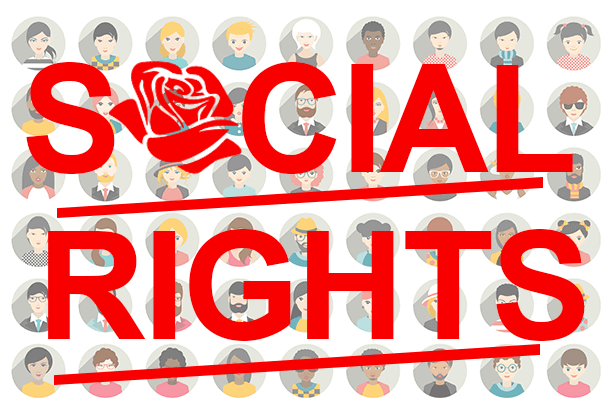Why do we need to study human/social rights or political science? It raised the issue of human rights on the agenda of modern politics, initially saw value only in the various natural rights (such as life, liberty, dignity and property) and did not see special importance in securing social rights necessary especially for the poor.
7 important social Rights
We need to study these subjects in order to understand roles of 7 important social Rights and responsibilities of different citizens that live with us. The industrial revolution and the enormous class gaps it created, led to the emergence of the demand to ensure the need for the physical existence of the citizens of the democratic state, citizens for whom ensuring their economic existence was more important than freedom of expression or the right to dignity. We will be discussing 7 important social Rights in this article so that you can have idea about the subject of politics or sociology.
Concept of the welfare state
Influenced by Communist, Social-Democratic and even liberal impacts, the post-World War II world took hold that the state must guarantee the minimum rights of its citizens. This determination created the concept of the welfare state.
What is scope of the social rights?
The issue that remains open for discussion is the question of real scope, that is, what is the scope of the social rights that the state is required to guarantee to its citizens. It should be borne in mind that the expansion of the scope will, of course, lead to a violation of the property rights of property owners, who will have to pay higher taxes to finance the welfare state.
On this issue there is controversy in the world, as well as in Pakistan, and various regimes, depending on their liberal or social-democratic view, ultimately expand or reduce the scope of social rights.
It is important to note that in Pakistan, social rights have not yet been recognized as basic rights, due to the government’s desire to retain the ability to manage the state budget according to its will and ability.
Social rights were concisely defined by social experts, who argued that the state must provide its citizens with “five mm”: food, shelter, clothing, medicine, a teacher.
The following is a breakdown of 7 important social Rights
1.The right to an adequate standard of living
A right that means providing government funding to economically weak citizens, with the aim of helping them to exist reasonably. As part of this financing, unemployment funds are provided to the unemployed and income support payments to the needy – on behalf of the National Insurance Institutes.
Also note that funds for various needy people, such as the elderly, the disabled or families with children should also be provided with no complex systems. The question of the amount of funding required for the existence of an adequate standard of living is of course controversial.
2.The right to housing
Under this right, every citizen is entitled to a roof over his/her head. In this context, the state assists young couples through affordable mortgages, and provides the needy with public housing at a cheap and sometimes even symbolic price.
3.The right to medical care
The state provides health services to all its citizens. As part of these services, which are funded by the citizens of the country through the “health tax”, the state allows the purchase of drugs with a substantial subsidy, the provision of medical solutions in clinics and hospitals and various medical treatments.
Due to the enormous amount of government health spending, there are occasional bitter debates over the state’s obligation to fund expensive drugs or special and complex treatments.
4.The right to education
The state is responsible for giving all its inhabitants the opportunity to study and be educated. Under this right, the state provides free education from kindergarten (3 years) to high school and largely subsidizes university studies.
Disagreements occasionally arise over the question of the extent of government support for universities and day care centers, as well as the question of the extent and quality of teaching hours – funded by the Ministry of Education. The state also funds schools and institutes of the religious sector.
5.The right to work & Earn
Within the framework of social rights, the state is obligated to provide employment for all its citizens. This right is especially important in times of severe unemployment, in which governments initiate “emergency jobs” for the unemployed.
It should be noted that the modern economy, based on global economy and liberal economy, is a controversial subject. We debate on different systems, like wealth distribution system, price determination system or the stock flow should be under government control or not. It is also important to distinguish between this right and freedom of occupation, a right according to which the state does not prevent a person from engaging in any profession but is not obligated to assist him/her.
6.The right to proper working conditions
This right is maintained in almost all democracies, and guarantees a reasonable wage (minimum wage) and adequate working conditions for workers, such as: limited working hours quota, weekly rest day, pension conditions, vacation and sick days, special conditions for pregnant and postpartum workers, etc.
This right is enshrined in extensive legislation (“regulation”) and like the other rights, there is a debate mainly about the desired scope between the workers’ organizations and the private employers.
7.The right to culture.
Under this right, the state funds various institutions that meet the leisure culture needs of its citizens. Thus, the state funds sports groups, theaters, film production, orchestras, public libraries and cultural institutions.
Against the background of this right, there is a debate over the question of the state’s obligation to fund cultural institutions whose “products” offend the feelings of a significant portion of the state’s citizens, such as theaters that offend some kind of ethical or religious values. However, it’s a long list of duties that a state must fulfil.
However, the government also need a proper response or acknowledge of responsibility towards it’s policies from the citizens. For example, tax payer should not conceal tax or business amount from government. The lawyers must insist people to declare exact assets for tax calculation. So, responsibilities are at both ends, but ultimate power to implement the system of justice will depends on a state.
Read more: Study opportunity in Australia










